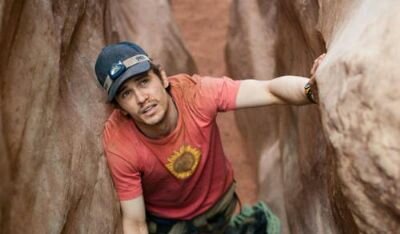| |
|
|
| |
|
|
| |
127 Hours
(15)
© Fox Searchlight - all rights reserved
|
| |
|
|
| |
 |
| Tookey's Rating |
|
|
8 /10
|
| |
| Average Rating |
|
|
8.29 /10
|
| |
| Starring |
James Franco  , Lizzy Caplan, Treat Williams , Lizzy Caplan, Treat Williams |
| Full Cast > |
|
|
|
| |
Directed by: Danny Boyle 
Written by: Danny Boyle, Simon Beaufoy, based on the book Between a Rock and a Hard Place by Aron Ralston
|
|
| |
|
| Tookey's Review |
|
| Pro Reviews |
|
| Mixed Reviews |
|
| Anti Reviews |
|
| Trailer |
|
| Cast |
|
| |
 |
| |
| Released: |
2010 |
| |
|
| Genre: |
THRILLER
BIOPIC
|
| |
|
| Origin: |
US |
| |
|
| Colour: |
C |
| |
|
| Length: |
95 |
|
| |
|
| |
|
|
| |
|
|
Danny Boyle’s last film was the occasionally grim but mostly feelgood Slumdog Millionaire. His very different follow-up pretty much defines the phrase “harrowing experience”.
|
Reviewed by Chris Tookey
|
People have been fainting at screenings in the States, and at the viewing I attended one person in my row left just after the most gruesome bit and never came back.
It’s a bravura piece of film-making that captures the resilience of the human spirit better than any movie since the Oscar-winning documentary Touching The Void, but it’s certainly not an easy sit.
It depicts seven crucial days in the life of mountain climber and canyoneer Aron Ralston (James Franco, pictured). For the first twenty minutes, he shows us he’s a daredevil, free-spirited sort of guy, at home in the outdoors and with a roving eye for the ladies. He introduces two attractive hikers (Kate Mara and Amber Tamblyn) to the joys of jumping into a hidden pool before leaving them to seek out more sensations.
Split-screens and a thumping electronic score by A.R. Rahman emphasise that Aron’s a can-do, energetic, adrenaline junkie.
But about 20 minutes in, he falls down a hole and his right arm is trapped between a fallen boulder and the cave wall. We see in his eyes that helplessness is a new sensation for him, and not one he ever expected.
For the next 70 minutes, he’s working out how to get free. As his water runs out and he starts to hallucinate, we learn more about his dark side: his selfishness, his unwillingness to commit, his taking his family for granted.
Thanks to Boyle’s direction, vibrant cinematography by Anthony Dod Mantle and Enrique Chedak and a wholly committed performance by Franco, we’re never bored. If Leni Reifenstahl hadn’t already nabbed the title, it might easily have been called Triumph of The Will.
It helps our empathy that Aron isn’t given to whining self-pity; he retains a bleak sense of humour, which is just as well because he’s going to need it – as well as that cheap, blunt pocket-knife.
Normally, I would not give away the ending, but the story is well-known, and Boyle foreshadows it throughout the movie, teasing the audience with knives and blades long before the end sequence.
Besides, it’s only fair to warn potential audience members that the climax involves the most harrowing bone-breaking and amputation scene in the history of cinema.
It’s extremely bloody, and in its realism it’s far more involving and upsetting than the foot-sawing scene in the first and best of the Saw series. It will be too much for many people, and it’s the reason why I can’t imagine this astonishingly well-crafted film achieving mainstream popularity. If you’re squeamish at the sight of blood, don’t go.
This is, ultimately, quite a simple piece. We know early on that our hero’s main faults are recklessness, self-centredness and narcissism, and it’s hard not to feel that he brings his problems upon himself. There are, in the end, no surprises. He learns not to be so much of a loner, and that’s that.
However, Franco gives a tremendous performance that is sure to receive an Oscar nomination, and this, combined with Boyle’s visual imagination, makes us share Ralston’s life-changing experience as fully as though we had lived through the trauma ourselves.
I leave it up to you whether you interpret that as a recommendation or a warning.
|
|
|
|
